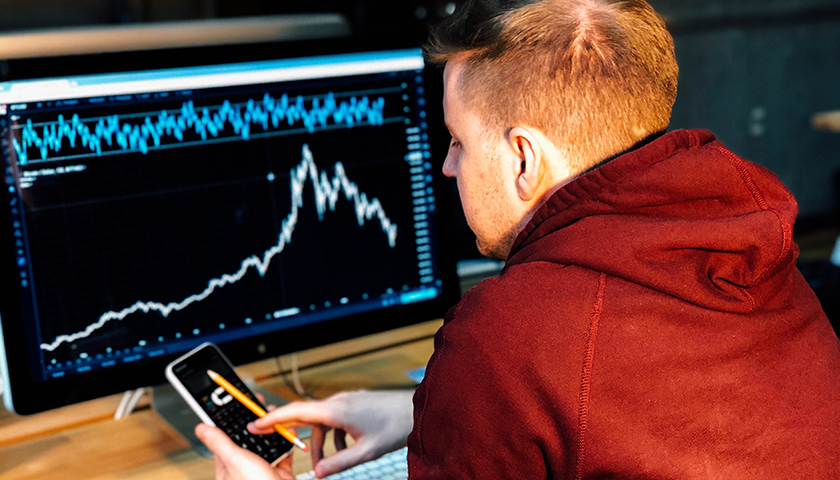by Catherine Mortensen
Are you having a hard time understanding why the housing market is heating up, and why the cost of essentials such as milk, eggs, and gas is climbing? Are you in the market for a used car? Then you know how expensive those are right now. And why can’t businesses find employees, yet millions remain unemployed? Economists agree the recovery isn’t like anything we’ve seen before. That’s because we’ve never had a situation before where the heavy hand of government shut down private enterprises on a nationwide scale. The market distortions are enormous. As states reopen, there is a herky-jerky feel to the economy that has many people unsettled.
Former Federal Reserve vice chairman Alan Blinder wrote in the Wall Street Journal recently, “the recovery is not linear. Rather, it is proceeding in fits and starts. Sales of physical goods, for example, dipped only briefly when Covid hit, recovered quickly, and are now well above their pre-pandemic levels. In stark contrast, businesses that deliver personal services, such as restaurants and hotels, suffered a devastating depression and are still below their pre-pandemic levels.”
By far the most uneven outcome so far since the economy crashed in spring 2000, besides the 7.6 million fewer jobs compared to pre-pandemic levels, has been inflation, which is up 5 percent the past 12 months.
Fear of rising prices seems to be a concern for many Americans right now. Federal Reserve Chairman Jerome Powell sought to ease those concerns this week when he told a Congressional panel that it’s highly unlikely inflation will rise to levels seen in the 1970s but acknowledged significant uncertainty as the economy reopens.
While the Fed anticipated that the end of the pandemic would temporarily push up inflation this year, Mr. Powell said that the increases in prices have been larger than central bankers had expected and may prove more persistent. But he underscored his view that shortages—including of used cars, computer chips and workers—will fade over time, bringing inflation closer to the Fed’s 2% long-run target.
“If you look behind the headline and look at the categories where these prices are really going up, you’ll see that it tends to be areas that are directly affected by the reopening,” Mr. Powell said in a hearing before a House subcommittee. “That’s something that we’ll go through over a period. It will then be over. And it should not leave much of a mark on the ongoing inflation process.”
Despite those assurances, the free-market economists at the Center to Unleash Prosperity (CTUP) say that inflation is still a threat. They have a new mantra, “Biden inflation taxes everyone.” It appears to be catching on. A new Harvard CAPS/Harris poll shows 85% of Americans are concerned about rising inflation. In recent months it has exceeded 6% – double the Fed’s 2.5% target rate.
While Americans are increasingly alarmed over rising gas and grocery prices, the poll also found that most Americans believe the Fed will keep inflation “in check.”
“Concern about inflation is reaching new highs as people begin to spend their savings from COVID lockdowns,” said Mark Penn, director of the Harvard CAPS/Harris poll. “The administration has to watch this as a potential issue on the horizon.”
Within hours of the release of the poll’s topline numbers, Republicans were already pointing fingers at Democrat spending as the problem.
“Everyday goods cost more because of the wasteful spending in Democrats’ socialist stimulus bill. Voters will hold them accountable,” said National Republican Congressional Committee Spokesman Mike Berg.
At Tuesday’s congressional hearing with Chairman Powell, Rep. Mark Green (R., Tenn.) echoed that concern. “When Congress spends trillions of dollars and the Fed prints money, something’s got to give,” Rep. Green said. He asked Mr. Powell whether the price increases seen in recent months are “the start of something that could be as bad as the ‘70s,” when inflation reached double digits.
Mr. Powell said such a scenario is “very, very unlikely,” in part because the central bank “is strongly prepared to use its tools to keep us around 2% inflation.”
But what about all the Biden-Schumer-Pelosi spending plans? Should we be concerned?
The CTUP economists have summarized Biden’s post-Covid spending ambitions compared to major wars and other major spending initiatives throughout history.
“Biden has called for three $2 trillion supplemental spending bills this year – one of which, the $1.9 trillion blue state bail out already passed in March. Trump endorsed about $3 trillion of new spending in 2020 – while the economy was locked down and the pandemic was in full throttle. How can Uncle Sam need twice as much money with the crisis over?”
We at Americans for Limited Government (ALG), like CTUP, are frustrated that some Republicans are talking about $1 trillion infrastructure compromise. We need to be cutting – not adding – $1 trillion from the most bloated budget in American history.
ALG has a simple message for Congress: stop the out-of-control spending.
As ALG President Rick Manning said, “Congress can and should act now to stop this obvious trend in its tracks by freezing federal spending at the normally appropriated levels of 2020 as well as ending all new and unspent COVID emergency spending. By stopping our nation’s double digit money supply growth, lawmakers would undercut the primary inflation driver.
“Inflation is dangerous because it is the ultimate hidden tax,” Manning explained. “Inflation means that our money becomes worth less, making the cost of things we purchase more expensive. The result right now is that real wages (how much you make versus how much it costs to buy the same things with that money) are going down and the higher the inflation rate the less a paycheck will buy. Naturally, that causes people to demand higher wages, which has the perverse effect of increasing the cost of goods and services creating a vicious cycle that is directly due to the federal government’s money supply increase,” concluded Manning.
– – –
Catherine Mortensen is Vice President of Communications for Americans for Limited Government.




